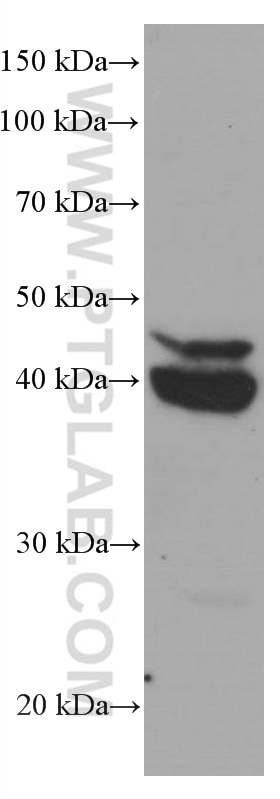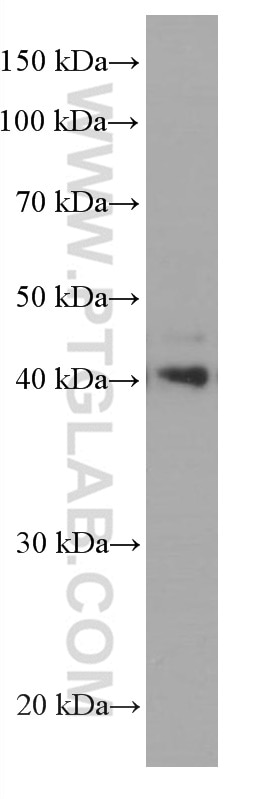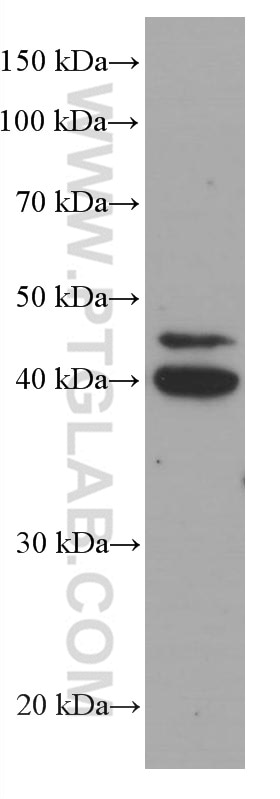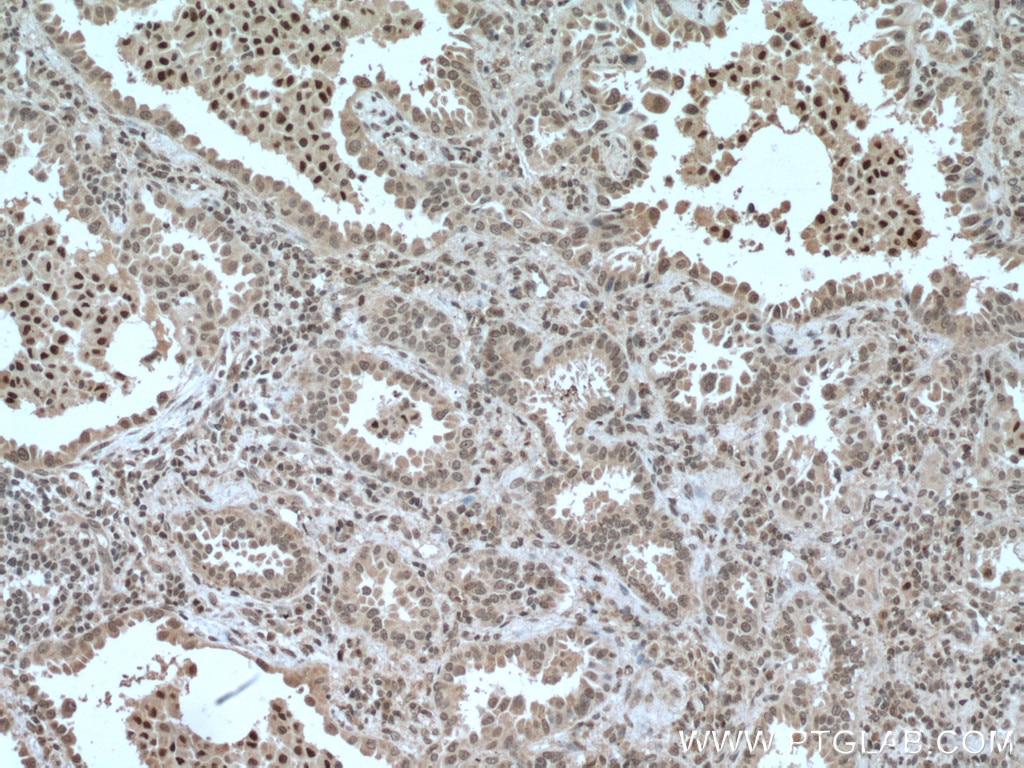CEBPB Monoklonaler Antikörper
CEBPB Monoklonal Antikörper für WB, IHC, ELISA
Wirt / Isotyp
Maus / IgG1
Getestete Reaktivität
human, Maus, Ratte und mehr (1)
Anwendung
WB, IHC, IF, ELISA
Konjugation
Unkonjugiert
CloneNo.
2B6E10
Kat-Nr. : 66649-1-Ig
Synonyme
Geprüfte Anwendungen
| Erfolgreiche Detektion in WB | HeLa-Zellen, HepG2-Zellen, L02-Zellen |
| Erfolgreiche Detektion in IHC | humanes Lungenkarzinomgewebe Hinweis: Antigendemaskierung mit TE-Puffer pH 9,0 empfohlen. (*) Wahlweise kann die Antigendemaskierung auch mit Citratpuffer pH 6,0 erfolgen. |
Empfohlene Verdünnung
| Anwendung | Verdünnung |
|---|---|
| Western Blot (WB) | WB : 1:1000-1:6000 |
| Immunhistochemie (IHC) | IHC : 1:150-1:600 |
| It is recommended that this reagent should be titrated in each testing system to obtain optimal results. | |
| Sample-dependent, check data in validation data gallery | |
Veröffentlichte Anwendungen
| WB | See 4 publications below |
| IHC | See 1 publications below |
| IF | See 1 publications below |
Produktinformation
66649-1-Ig bindet in WB, IHC, IF, ELISA CEBPB und zeigt Reaktivität mit human, Maus, Ratten
| Getestete Reaktivität | human, Maus, Ratte |
| In Publikationen genannte Reaktivität | human, Affe, Maus, Ratte |
| Wirt / Isotyp | Maus / IgG1 |
| Klonalität | Monoklonal |
| Typ | Antikörper |
| Immunogen | CEBPB fusion protein Ag20073 |
| Vollständiger Name | CCAAT/enhancer binding protein (C/EBP), beta |
| Berechnetes Molekulargewicht | 345 aa, 36 kDa |
| Beobachtetes Molekulargewicht | 40-45 kDa |
| GenBank-Zugangsnummer | BC007538 |
| Gene symbol | CEBPB |
| Gene ID (NCBI) | 1051 |
| Konjugation | Unkonjugiert |
| Form | Liquid |
| Reinigungsmethode | Protein-G-Reinigung |
| Lagerungspuffer | PBS with 0.02% sodium azide and 50% glycerol |
| Lagerungsbedingungen | Bei -20°C lagern. Nach dem Versand ein Jahr lang stabil Aliquotieren ist bei -20oC Lagerung nicht notwendig. 20ul Größen enthalten 0,1% BSA. |
Hintergrundinformationen
CCAAT/enhancer-binding protein beta (CEBPB), also known as LAP, is a important transcriptional activator in the regulation of genes involved in immune and inflammatory responses. It specifically binds to an IL-1 response element in the IL-6 gene. NF-IL6 also binds to regulatory regions of several acute-phase and cytokines genes. It probably plays a role in the regulation of acute-phase reaction, inflammation and hemopoiesis. The consensus recognition site is 5'-T[TG]NNGNAA[TG]-3'. Functions in brown adipose tissue (BAT) differentiation By similarity. Regulates the transcriptional induction of peroxisome proliferator-activated receptor gamma (PPARG). CEBPb mRNAs possess alternative translation-initiation codons, which result in the formation of truncated forms of the protein. All major isoforms of CEBPB (38, 34, and 20 kDa) are expressed, with the 34 and 20kDa isoforms being more abundant in preovulatory follicles and further increased in corpora lutea (CL)(PMID:15647458).The truncated protein of 18 kDa (relative to the 30 kDa full-length protein that is known as LAP, or p30 CEBPb or liver-activating protein) lacks a transactivation domain,also known as LIP (p19 CEBPb or liver-inhibitory protein), can form homodimers or heterodimerize with other family members and, as it lacks the transactivation domain, can attenuate the transcriptional activation properties of the other isoforms.(10051447). Three variants of CEBPBs have been detected in many cell types: a 46 kDa full-length liver-enriched transcription-activating protein (LAP1), a 42 kDa LAP2 and a 20-kDa liver-enriched transcription-inhibitory protein (LIP). These variants are the result of an alternative translation initiation due to a leaky ribosomal scanning mechanism.(PMID:18820298).
Protokolle
| PRODUKTSPEZIFISCHE PROTOKOLLE | |
|---|---|
| WB protocol for CEBPB antibody 66649-1-Ig | Protokoll herunterladen |
| IHC protocol for CEBPB antibody 66649-1-Ig | Protokoll herunterladenl |
| STANDARD-PROTOKOLLE | |
|---|---|
| Klicken Sie hier, um unsere Standardprotokolle anzuzeigen |
Publikationen
| Species | Application | Title |
|---|---|---|
Int J Biol Macromol CircDYM attenuates microglial apoptosis via CEBPB/ZC3H4 axis in LPS-induced mouse model of depression | ||
Int J Mol Sci Piperine Improves Lipid Dysregulation by Modulating Circadian Genes Bmal1 and Clock in HepG2 Cells. | ||
Stem Cell Res Ther The effects of BMMSC treatment on lung tissue degeneration in elderly macaques. | ||
J Ethnopharmacol Hydrangea paniculata coumarins alleviate adriamycin-induced renal lipotoxicity through activating AMPK and inhibiting C/EBPβ | ||
Cell Mol Life Sci Single-cell RNA sequencing of the carotid artery and femoral artery of rats exposed to hindlimb unloading | ||
Dev Cell STAT3-controlled CHI3L1/SPP1 positive feedback loop demonstrates the spatial heterogeneity and immune characteristics of glioblastoma |
Rezensionen
The reviews below have been submitted by verified Proteintech customers who received an incentive for providing their feedback.
FH Boyan (Verified Customer) (01-25-2019) | Good. It only works for human CEBPb protein, because the antigen of this antibody is targeting the N-terminus of the protein, which is not conserved in human and mouse.
|





